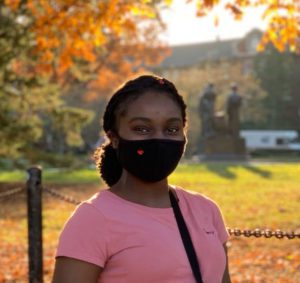
My mental health has been something I have struggled with since I was in elementary school. For most of my life, I can say that it has been challenging to do daily tasks, remain motivated, and build connections with others due to my depression and anxiety. When I first started experiencing the apprehension of being in crowds, lack of energy and mood fluctuations, the support and guidance of school counselors, my family, and other psychiatric professionals helped me understand what I was experiencing and how to better manage my symptoms. Despite my improvement, my mental health continues to impact how I navigate the world.
In my first semester of college, the stress of relocating, trying to meet deadlines, being away from my family for the first time, attempting to be self-sufficient, and being bombarded with more responsibilities, took its toll on my mental wellbeing. However, due to the encouragement of my family and my aim to do well in college, I managed to complete the academic year. However, by my Sophomore year, my mental health began to take a turn for the worst. I was experiencing anxiety attacks, migraines, constant fatigue, and a lack of energy/motivation. This made it difficult for me to focus on lectures, interact with my classmates, and get up and go to class. I noticed my grades began to drop, I had to leave my job due to my anxiety, and I pulled back from the extracurricular activities I was involved in. I held several leadership positions in my school and felt disappointed in myself for not remaining committed to the responsibilities. But I realized that my mental health was an essential part of who I am and I needed to focus on me, first.
Therefore, I decided the best course of action was to reach out to the counseling services at my school, the University of Illinois Urbana-Champaign (UIUC). Although utilizing these services helped me control my anxiety and depression, there is still room for improvement in getting students to battle mental illness and acquire adequate help. For instance, students are only allowed to meet with a therapist one-on-one for a limited number of times a semester. This is an issue for those who may require regular treatment with a counselor to function in their school life. If a student needs that type of steady support, they recommend joining one of the therapy groups available to students. However, these groups are challenging to get into and don’t have widely accessible times for busy college students.
Another option would be to schedule an appointment with the psychiatric department, but they usually have a very long waiting list, so getting treatment when needed is hard to come by. Also, there are mindfulness workshops available. But, these are usually short and do not address the core problems students are encountering. The process of getting disability services for mental health is a long and taxing one for students. So, students usually get accommodation services later in their college careers.
With this being said, I do appreciate the effort my university put in place for students dealing with mental health problems because without these services, I believe I would not have made it to my senior year. Which is a big accomplishment for me because I am a first-generation student from a low-income single-parent household.
One of the biggest setbacks that makes it hard for colleges to support their students’ mental well-being is funding. Colleges and universities need the staff and resources to fully support all our students suffering from either short or long-term mental health concerns while earning their degrees. I believe it is crucial to give the necessary resources to support these students. In 2019, Illinois took a step forward by passing a framework to improve and enhance mental health services in public colleges and universities. Yet, the legislature has yet to put forth the state dollars necessary for institutions to fully implement the law.
We must fund the Mental Health on Campus Act to give students access to the services they need.
Melissa is currently a senior at UIUC majoring in Psychology and minoring in Communications. She is a Chicago native and the eldest of a single-parent household.
